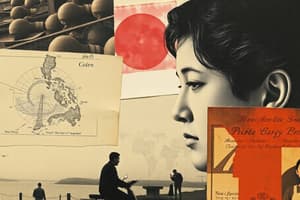Podcast
Questions and Answers
Filipino ______ were only called Filipinos in 1898 by Spanish Governor-General Basilio Augustin who wanted to win support from the Indios to support Spanish troops against the impending American attack
Filipino ______ were only called Filipinos in 1898 by Spanish Governor-General Basilio Augustin who wanted to win support from the Indios to support Spanish troops against the impending American attack
natives
Racial ______ was at an all-time high during the 19th century, which in turn fed the spirit of Filipino nationalism
Racial ______ was at an all-time high during the 19th century, which in turn fed the spirit of Filipino nationalism
discrimination
All propagandists advocated for ______ and assimilation or application of Spanish laws and rights in the colony so that all people will be equally treated as Spanish citizens rather than second class citizens
All propagandists advocated for ______ and assimilation or application of Spanish laws and rights in the colony so that all people will be equally treated as Spanish citizens rather than second class citizens
reforms
Representation in the Spanish parliament was also being pushed for the secularization of the ______, and the abolition of the polo y servicios
Representation in the Spanish parliament was also being pushed for the secularization of the ______, and the abolition of the polo y servicios
Initially, the term Filipino was only given to Spaniards who were born in the Philippines, also known as the ______, while those who were born in mainland Spain were called Peninsulares
Initially, the term Filipino was only given to Spaniards who were born in the Philippines, also known as the ______, while those who were born in mainland Spain were called Peninsulares
Indio was a derogatory term used by the Spaniards to refer to the Filipino _______
Indio was a derogatory term used by the Spaniards to refer to the Filipino _______
The term _______ was only given to Spaniards who were born in the Philippines, also known as the Insulares
The term _______ was only given to Spaniards who were born in the Philippines, also known as the Insulares
The spirit of Filipino nationalism was fed by the high level of _______ discrimination during the 19th century
The spirit of Filipino nationalism was fed by the high level of _______ discrimination during the 19th century
All propagandists advocated for reforms and assimilation or application of Spanish laws and rights in the colony so that all people will be equally treated as Spanish citizens rather than second class _______
All propagandists advocated for reforms and assimilation or application of Spanish laws and rights in the colony so that all people will be equally treated as Spanish citizens rather than second class _______
The abolition of the polo y servicios and the secularization of the clergy were part of the push for representation in the Spanish parliament and for the _______ of the clergy
The abolition of the polo y servicios and the secularization of the clergy were part of the push for representation in the Spanish parliament and for the _______ of the clergy
Flashcards
Who were the "Filipinos"?
Who were the "Filipinos"?
Originally referred to Spaniards born in the Philippines (Insulares); later applied to natives.
What does "Indio" mean?
What does "Indio" mean?
Term given to native Filipinos by the Spanish; a derogatory label.
What is racial discrimination?
What is racial discrimination?
Racial prejudice and bias experienced by Filipinos during the 19th century.
What are "reforms"?
What are "reforms"?
Signup and view all the flashcards
What is assimilation?
What is assimilation?
Signup and view all the flashcards
Representation in Parliament?
Representation in Parliament?
Signup and view all the flashcards
Secularization of clergy?
Secularization of clergy?
Signup and view all the flashcards
What is polo y servicios?
What is polo y servicios?
Signup and view all the flashcards
What are Insulares?
What are Insulares?
Signup and view all the flashcards
What are civil rights?
What are civil rights?
Signup and view all the flashcards
Study Notes
The Term "Filipino"
- In 1898, Spanish Governor-General Basilio Augustin used the term "Filipino" to gain support from the Indios against the American attack.
- Before this, "Filipino" only referred to Spaniards born in the Philippines, known as Insulares.
Racial Discrimination
- Racial discrimination was prevalent during the 19th century, fueling Filipino nationalism.
- "Indio" was a derogatory term used by Spaniards to refer to Filipinos.
Propagandist Goals
- Propagandists advocated for equal treatment of all people as Spanish citizens, regardless of birthplace.
- They sought assimilation, the application of Spanish laws and rights to the colony.
Reforms and Representation
- Propagandists demanded representation in the Spanish parliament.
- Reforms included the abolition of "polo y servicios" (forced labor) and secularization of the clergy.
- The secularization of the clergy aimed to remove the influence of the Church over the colonial government.
Studying That Suits You
Use AI to generate personalized quizzes and flashcards to suit your learning preferences.




